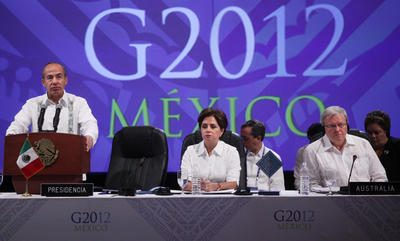The government’s white paper, Australia in the Asian Century, is a superb launch pad for Australia’s vision and role in the world.
Under the surface of the G20’s economic agenda lurk geopolitical security issues that are undermining cooperation and consensual outcomes. Nowhere is this clearer than in Asia, which leads the global economy but is beset by security tensions between major players. With the G20 presidency, Australia can shift the focus of governance and economic reform to this region.
The big countries do not trust each other, and the rest of the world does not trust the G20. Australia can change this by using its position to improve relations among the major G20 economies and beyond. In some ways, the G20 Summit mechanism forces all member countries to behave like middle powers, which are in the majority. This is a good thing for a number of reasons.
First, middle powers represent more than themselves and their narrow self-interest in global affairs. They tend to place multilateralism at the centre of their foreign policies, nesting their national interests with broader regional or global interests. As a result, middle powers tend to inculcate a higher level of trust than larger powers.
Second, middle powers punch above their weight. Australians might well feel hesitant about whether a country of 23 million people can have much influence in a world of 193 countries, in which major powers have hundreds of millions of people. But at the G20 a large population and hefty GDP can be trumped by ideas, style, leadership ability, consensus-building skills, intelligence, trust and respect. Soft power tends to outweigh hard power, once a country is at the table.
Third, middle powers tend to take a pragmatic approach to global problems rather than an ideological one — substance tends to trump positioning. Middle powers tend to adjust their alliances with other countries depending on the issue being dealt with rather than relying on fixed alignments. The presence of so many pragmatic middle-power countries in the G20 has thus contributed to shifting coalitions of consensus on different issues based on interests rather than fixed positions.
Fourth, middle powers tend to cushion the tensions between major powers. Few officials in Washington or Beijing are overtly fond of the G2 notion as a leadership mechanism for the world, though both countries give high priority to their bilateral relations. The United States and China find the G20 a comfortable setting in which to work through global issues of consequence to them in light of the interests and perspectives of other, smaller players.
The G20 has achieved little since it delivered a coordinated response to the financial crisis in 2008–09. Currency wars and debates about technical indicators of imbalance overwhelmed the real accomplishments in Seoul in 2010; Greece’s proposed referendum on the Greek austerity package tsunamied the Cannes Summit in 2011; and the euro crisis overshadowed other G20 accomplishments at Los Cabos in 2012. The Russian G20 team, like others before them, is preparing well for this year’s St Petersburg summit, but scepticism remains about the outcome.
As a result, Australia will take on the G20 presidency at a time when the institution is losing credibility. What can be done?
The euro crisis has yet to become a global crisis, and Europe has never been eager for G20 intervention. Australia could maintain a vigilant watching brief on the euro crisis, ready to react if need be, but not devote much time to Europe on the formal agenda. G20 leaders should consider issues relevant to all people around the world, not just issues of greater consequence to the top end of global finance. Instead, the growing importance of Asia in the world economy means that economic developments there warrant greater attention. In particular, the example of Asia’s more dynamic growth through trade and its greater emphasis on education, social inclusion and equality would bring development to the fore and encourage more G20 focus on trade as a contributor to global recovery. The huge increases in infrastructure investment would have repercussions beyond the region, boosting growth and the recovery in developed economies. Inviting fewer European countries as observers to the summit in 2014, and drawing the Asian G20 members into playing a more active leadership role in the G20, would help advance this agenda.
There is a tension, well understood in Australia, between narrowing the G20 agenda to deliverables on core issues and broadening the agenda to embrace longer-term strategic issues like climate change. One way to deal with this dilemma is to deliver the core agenda through the action plans and work streams that are agreed to in the run-up to G20 Brisbane. This would allow G20 leaders to focus on longer-term global challenges, differentiating their results in a leaders’ statement that would stand apart from the inter-governmental work stream issues which finance ministers, central bank governors and other senior officials can concentrate on.
Australia can capitalise on its G20 presidency in 2014 to exercise both regional leadership in Asia and global leadership on global issues. The 2014 G20 presents a great opportunity for Australia to use its middle power assets and Asia Pacific positioning to contribute significantly to the global good.
Colin I. Bradford is a non-resident senior fellow in the Global Economy and Development Program at the Brookings Institution. He was previously Chief Economist of the United States Agency for International Development and Research Professor of Economics and International Relations and Distinguished Economist in Residence at American University.

